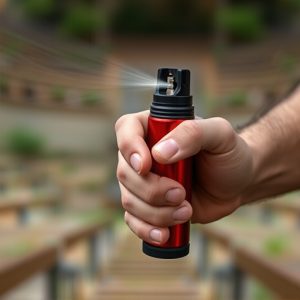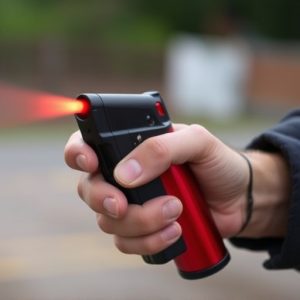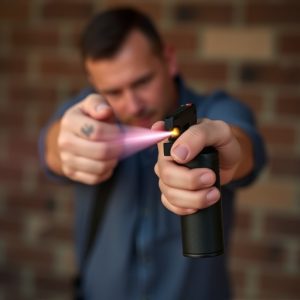Guiding Civilian Use of Pepper Spray: Legalities, Safety, and Selection
To legally carry pepper spray for self-defense, understand its composition, local regulations, and s…….
To legally carry pepper spray for self-defense, understand its composition, local regulations, and safety guidelines. Meet age requirements, complete training, obtain permits, and register with authorities. Choose a reputable brand that suits personal needs and adheres to legal limits on quantity and carrier types. Store securely, maintain records, inspect regularly, and use responsibly while aware of surroundings.
In today’s world, personal safety is paramount. One effective tool gaining traction among civilians for self-defense is inflammatory spray, also known as pepper spray. This article delves into the intricacies of civilian pepper spray use, offering a comprehensive guide on understanding its composition, navigating legal frameworks for ownership, choosing the right spray, and implementing safe handling practices. By exploring these key aspects, we empower individuals to make informed decisions about how to legally carry pepper spray for personal protection.
- Understanding Pepper Spray: Its Composition and Effects
- Legal Framework for Civilian Pepper Spray Ownership
- Choosing the Right Pepper Spray for Personal Protection
- Safe Handling and Storage Practices for Pepper Spray Devices
Understanding Pepper Spray: Its Composition and Effects
Pepper spray, also known as oleoresin capsicum (OC) spray, is a non-lethal self-defense tool designed to incapacitate an attacker temporarily. Its primary active ingredient is capsaicin, the chemical that gives chili peppers their heat and irritant properties. This compound stimulates nerve endings in the eyes, nose, and respiratory system, causing intense irritation and pain. The effect is swift but usually wears off within minutes, allowing individuals to escape or seek help.
When considering how to legally carry pepper spray for civilian protection, it’s crucial to understand its composition and effects. Each spray canister contains a specific concentration of capsaicin, typically measured in milli-grams (mg). Common legal limits range from 0.5% to 2%, ensuring the spray is potent enough for self-defense but not so strong as to cause prolonged or excessive harm. Always check local laws regarding pepper spray possession and use, as regulations vary widely between regions.
Legal Framework for Civilian Pepper Spray Ownership
In many countries, civilians are allowed to legally own and carry pepper spray for self-defense purposes under specific legal frameworks. The regulations vary significantly from one region to another, so understanding your local laws is essential before considering purchasing and carrying such a device. Knowledge of how to legally carry pepper spray ensures you remain within the boundaries set by your jurisdiction, protecting yourself while avoiding potential legal repercussions.
To legally acquire and carry pepper spray, individuals typically need to meet certain criteria, including age restrictions (often 18 years or older), completion of a safety training course, and obtaining the necessary permits or licenses. Some areas may also mandate registering the spray with local authorities. Staying informed about these requirements ensures that you can use the self-defense tool appropriately and responsibly while enjoying your right to protection in public spaces.
Choosing the Right Pepper Spray for Personal Protection
Choosing the right pepper spray for personal protection involves understanding your needs and local regulations. It’s crucial to select a product that suits your comfort level, carrying preference, and budget. Look for factors like spray range, potency (measured in capsaicin units), and time of incapacitation claimed by the manufacturer. Always opt for reputable brands that provide detailed usage instructions and safety guidelines.
When considering how to legally carry pepper spray, ensure you familiarize yourself with your area’s laws and restrictions. Requirements vary widely, so check local and state regulations to understand permitted quantities, types of carriers allowed (holsters, pockets, etc.), and any necessary permits or licenses. Understanding these legal aspects is essential for responsible and compliant civilian protection.
Safe Handling and Storage Practices for Pepper Spray Devices
When handling and storing pepper spray devices, it’s crucial to prioritize safety and legality. Always keep them in a secure location, out of reach of children and unauthorized individuals. Store them in cool, dry places, away from direct sunlight or extreme temperatures. It’s important to understand local laws regarding where and how you can legally carry pepper spray. Typically, this involves obtaining a permit or license and adhering to specific restrictions on capacity and storage. Regularly inspect your devices for any signs of damage or malfunction, ensuring proper functioning before each use. Additionally, maintain accurate records of purchase and registration to comply with legal requirements and facilitate easy identification if needed during lawful carrier checks.
To legally carry pepper spray, follow these best practices: keep it in its original packaging, clearly labeled; only remove it when necessary for self-defense or as permitted by law; and always be aware of your surroundings, respecting the rights and safety of others nearby. Remember, responsible ownership and handling are key to ensuring its effectiveness as a civilian protection tool while adhering to legal guidelines.
Pepper spray has emerged as a powerful tool for personal protection, offering civilians a means of self-defense against potential threats. By understanding its composition, legal considerations, and safe handling practices, individuals can make informed decisions about owning and carrying pepper spray legally. Choosing the right device tailored to personal needs and following best storage practices ensures its effectiveness when needed most. Armed with knowledge, responsible citizens can protect themselves while navigating the legal framework for civilian pepper spray ownership.


